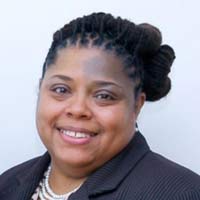Reskilling for Tomorrow: The Nonprofit Per Scholas Partners with Tech Companies
“We work closely with employers to ensure that the skills we’re teaching are in line with their business needs. We work with employers to design curriculum, to engage with students through lunch-and-learns, mock interviews, coaching, and in building our students’ social capital.”
– Bridgette Gray, Executive Vice President of National Programs at Per Scholas
As the rate of technological advancement increases, the interval between reskilling trainings continues to dwindle. In the 21st century, employers require entry-level employees to be proficient in more software, tech, and soft skills than ever before. Classic models of experience and employment grow less relevant by the day. A versatile repertoire of technical skills and experiences can prepare young job candidates for a future with reskilling (and upskilling) at the forefront.
Through expert interviews, the “Reskilling for Tomorrow” series covers initiatives to prepare the U.S. workforce of the future, including employer-led approaches and public-private partnerships. These paths emphasize the cultivation of growable tech skills to help combat income and employment inequality, whether via classrooms or apprenticeships.
Among the most esteemed of these efforts is the national non-profit organization Per Scholas, which provides tech training and skilling to in-need groups, including the unemployed and those who are locked into low-wage positions. Its flexible and innovative programs boast an impressive track record that’s completely dedicated to America’s future economic success.
In its 22-year history, its efforts have not gone unnoticed. At Google’s Diverse By Design meeting in 2017, Chelsea Clinton, vice chair of the Clinton Foundation, gushed, “Per Scholas gives me hope that we can tackle our country’s hardest problems.”
What is Per Scholas and What Do They Do?
In 1995, Per Scholas began as an initiative to increase access to personal computers for children and families in New York. Since then, it has grown immensely, becoming a leading force in pioneering cutting-edge reskilling for young students. It designs and implements intense, hands-on training courses and exams for a number of positions in the IT field. The organization provides office-equipment training programs, hands-on computer courses, computer literacy for low-income seniors, computer technician training, computer recycling, and programs that donate refurbished materials to disadvantaged neighborhoods, families, students, and schools.
Featured Interviewee: Bridgette Gray, Executive Vice President of National Programs at Per Scholas

Bridgette Gray serves as the executive vice president of national programs, managing program operations for all eight Per Scholas training sites. Previously, Gray led Per Scholas in the National Capital Region out of their downtown Silver Spring, MD location.
Gray has spent more than 20 years helping people access and benefit from training and employment opportunities. She served as the deputy director for Year Up, an IT training organization for young adults. She later was the executive director for Career Team, an organization that provides training, case management, and job placement services for the Region’s most vulnerable residents. Notably, she has also managed AmeriCorps state and national programs for the Points of Light Foundation and serves on the Montgomery County Workforce Development Board.
How Does Per Scholas Work?
Bridgette Gray was a key figure in leading Per Scholas’s cybersecurity training efforts in the National Capital Region, which included a regional cybersecurity task force and partnerships with both Capital One and Symantec.
“We collaborate with businesses to help us design industry and job-specific curriculum that speaks to their talent needs now and as they plan for future tech growth,” says Gray. “We teach tech and professional skills that prepare students to not only build their technical aptitude, but also to develop their professional skills—soft skills that prepare them to be good team members and thought leaders.”
One feature that makes Per Scholas unique is that it provides numerous post-education services to its graduates. “We match our amazing graduates with employers to fill their talent needs and we provide talent acquisition,” says Gray. “We create partnerships to support our students with any barriers they might be facing and we provide two years of alumni support with additional skill-building and overall professional development.”
In part, it is these partnerships that solidify a total tech learning environment where instructor expertise meets student enthusiasm: “We’ve been so successful because of our employer-facing approach,” says Gray. “We work closely with employers to ensure that the skills we’re teaching are in line with their business needs. We work with employers to design curriculum, to engage with students through lunch-and-learns, mock interviews, coaching, and in building our students’ social capital. Our business solutions team works with 500-plus employers nationwide to source candidates for tech roles across all sectors.” This includes continuous coaching and career development assistance for all alumni following completion of the program.
Through an online portal, students who are interested in taking part in Per Scholas programs can choose the location closest to them. “Nationwide, Per Scholas has provided IT and tech training to over 10,000 individuals,” says Gray. The goal is to help spur economic development in their communities by preparing people for successful careers in technology.
“We began scaling our impact nationally in 2012, opening sites in Columbus, Cincinnati, Silver Spring, Maryland in the National Capital Region, Dallas, Atlanta, Baltimore, Newark, and Greater Boston,” says Gray. Notably, Per Scholas never loses sight of its specialization and continues to hone its ability to impart tech skills: “We stay in our lane: we teach tech and that’s what we do well.”
Alleviating Poverty, Increasing Diversity
A 2016 WorkAdvance study identified several positive outcomes for Per Scholas participants. Gray stated, “The WorkAdvance study demonstrated Per Scholas’s ability to increase income while also reducing the use of public assistance programs. It also provided evidence that Per Scholas graduates reported higher levels of life satisfaction than that of the control group.”
One employer that Per Scholas partners with is TEKsystems, an industry leader in IT, supporting training and development in Boston, Detroit, and Philadelphia. “TEKsystems has been a national hiring and thought partner with Per Scholas, hiring 400+ graduates since 2010. As tech needs have evolved, so has the supply and demand for businesses,” says Gray.
“Successful graduates will partner with TEKsystems recruiters in each city and be given access to the full suite of graduate services Per Scholas provides with two years of alumni follow-up and support,” says Gray. “Skills-based training tracks will be determined from the demand in each local market and may include skills relevant to cybersecurity, software engineering, and data engineering among others.”
The TEKsystems investment is expected to unite talent and motivation in individuals who have exhibited in-demand skills. Over the next three years, Per Scholas will train a minimum of 540 candidates for IT and tech positions in major cities where the need is greatest.
“Bringing this partnership to scale will ensure that future career opportunities are accessible by all communities, and that equity is a primary consideration as regional and national economies develop,” says Gray. “Nationally, 87 percent of Per Scholas students are people of color and 30 percent are women.”
With exceptional outcomes in improving diversity in tech and alleviating poverty in vulnerable communities, it’s not surprising that hundreds of companies have taken a keen interest in Per Scholas: “Per Scholas partners with over 500 businesses, across both public and private sectors in the United States, to offer diverse and qualified talent solutions for a wide range of technology careers,” says Gray. “Employer partners report that Per Scholas graduates have higher retention rates, are better problem-solvers, and increase the diversity of their teams.”
The Future of Per Scholas
In 2019, the scope of the Per Scholas vision has expanded even further. With a strategic investment plan announced recently, the NPO has committed to a $31 million growth campaign over the next five years.
Additionally, Per Scholas announced an expansion of their program to train high school students: “The overarching goals of the New Skills for Youth initiative, funded by JP Morgan Chase, are to dramatically increase the number of students who successfully complete career pathways that begin in secondary school and culminate in postsecondary degrees or credentials tied to high-wage, high-demand jobs,” says Gray.
She believes that the New Skills investment is “providing Per Scholas with an opportunity to expand on ideas cultivated with adults to design employer-informed, work-based learning curriculum modules that will be used in high schools to expose students to careers in technology.”
Overall, the focus and mission of Per Scholas is to facilitate the introduction of creative technologies to people of all ages—encouraging reskilling and upskilling in their progressive, industry-informed programs. The organization is an exceptional model for how NPOs and private businesses can partner to shape workforce skills that meet market demands.
